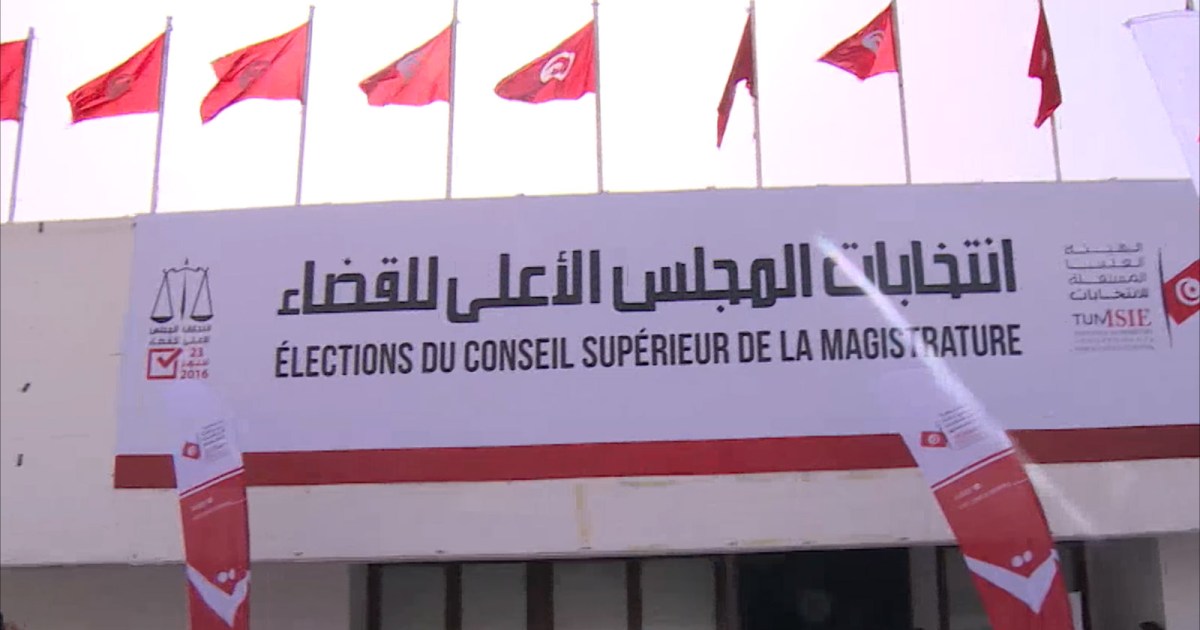The Supreme Judicial Council in Tunisia said, on Friday, that it rejects smear campaigns against its members, and will continue to perform its duties in defense of the independence of the judiciary, following decisions by President Kais Saied described as interfering in the work of the Council, while Al-Jazeera correspondent said that parties filed a lawsuit against the Minister of Interior Tawfiq. Sharaf El-Din on the dispersal of demonstrations last Friday.
In a statement, the Supreme Judicial Council warned of the danger of compromising the constitutional structure of the judiciary, calling on judges to uphold their independence, and condemned the interference in its work and refused to continue to violate its powers.
The council’s statement came two days after President Saeed issued a decree to put an end to the grants and privileges granted to members of the Supreme Judicial Council (45 members), and a day later, the President of the Republic said that the judiciary is free, and that he is working to remain so, but he stressed that the judiciary is not the state or the government. He must enforce the law, adding that what he called impunity must end.
On the other hand, the head of the Supreme Judicial Council, Youssef Bou Zakher, said that the council considers that the decree to stop grants issued by Saeed prejudices the judicial authority and the powers of the Supreme Judicial Council, stressing - in an interview with Al Jazeera on Thursday - that this decree will not deter judges from carrying out their duties.
Former Dean of Lawyers
Al Jazeera learned that the Tunis Lawyers' Branch received a correspondence from the Military Court of Appeal in Tunis informing it of referring the former Brigadier General of Tunisian Lawyers Abdel Razzaq Al Kilani to the military judiciary, for what he called "acts criminalized by law", without mentioning those acts referred to.
The text of the correspondence stated that the branch would be informed later of the content of these crimes and the legal texts associated with them.
The Tunisian president had referred to al-Kilani, without naming him, and accused him of inciting security forces to disobey orders.
It is noteworthy that on Thursday, Al-Kilani filed a complaint with the judiciary against the Minister of Interior and all those who will be revealed by the research after the attack he was subjected to by security forces on the 14th of this month while the security forces prevented a popular demonstration to commemorate the 11th anniversary of the revolution.
break up the demonstrations
On the other hand, Al-Jazeera correspondent said that Tunisian parties filed a lawsuit against the Minister of the Interior and the Director of Security over the dispersal of demonstrations last Friday, in order to commemorate the 11th anniversary of the outbreak of the revolution that toppled the late President Zine El Abidine Ben Ali.
This is related to the Democratic and Republican Current parties, the Democratic Alliance for Labor and Freedoms, and Tunisian national figures who accused the police of using excessive violence against protesters on the anniversary of the revolution.
These parties said - in a joint statement - that the violent police intervention came in implementation of instructions from the Ministry of Interior, in clear violation of the constitution and the law, as they put it.
And on Thursday, the frozen Parliament Speaker Rashid Ghannouchi said - during the funeral of the body of protester Reda Bouziane, who died after being injured in the demonstrations last Friday - that his killing is a state crime, adding that the accused is the Minister of Interior and President Qais Saeed, until proven otherwise, as he put it.
The Ennahda movement and Citizens Against the Coup say that Bouziane died as a result of the security forces' assault on him during the celebration of the anniversary of the revolution, and the leader of the Ennahda movement, Imad Khamiri, said that the demonstrators last Friday were subjected to what he described as unprecedented repression.
judicial investigation
On Wednesday evening, the Court of First Instance in the Tunisian capital announced the opening of an investigation into the death of Bouziane, who was found on the day of the demonstrations in a fainting state and without any visible signs of violence. "It exercised the utmost restraint and gradually used water to disperse the demonstrators who deliberately stormed the barriers and attacked the security forces."
In a related context, United Nations Secretary-General Antonio Guterres said, on Friday, that the organization "is following with concern the situation in Tunisia, calling for "preserving the democratic revolution and removing fears by fully restoring a democratic framework that works for all Tunisians."
It is noteworthy that Tunisia has been suffering since last July 25, an escalating political crisis, when President Said imposed exceptional measures, including freezing the competencies of Parliament, issuing legislation by presidential decrees, dismissing the government, and appointing new ones.
The majority of political forces in the country reject these measures, and consider them a coup against the constitution, while other forces support them, seeing them as a correction to the course of the 2011 revolution.

